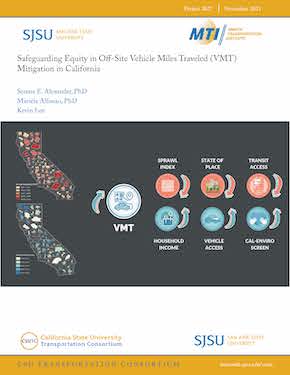- 408-924-7560
- mineta-institute@sjsu.edu
- Donate
Safeguarding Equity in Off-Site Vehicle Miles Traveled (VMT) Mitigation in California
Historically, the State of California assessed the environmental impacts of proposed developments based on how it was projected to affect an area’s level of service (LOS). However, as LOS focused on traffic delays, many agencies simply widened roads, which was an ineffective way to reduce greenhouse gas emissions (GHGs). With the passage of Senate Bill (SB)743 in 2013, LOS was replaced by Vehicle Miles Traveled (VMT) as a more appropriate metric by which to gauge the environmental impacts of proposed development. Additionally, SB 743 presented an opportunity for off-site VMT mitigation strategies through banking and exchanges– allowing multiple development projects to fund a variety of strategies to reduce VMT elsewhere in the city or region. While the shift from LOS to VMT has generally been lauded, concerns remain about how to apply SB 743 effectively and equitably. This study aimed to: 1) understand how local governments are addressing this shift toward VMT while ensuring equity, including its approaches to off-site VMT mitigation; and 2) evaluate the various built environment factors that impact VMT, which should be considered by local governments, using both qualitative and quantitative research designs. The study posited that both micro and macro level aspects of the built environment needed to be considered when evaluating the impacts of proposed development on VMT, not only to ensure higher accuracy VMT models, but also because of the potential equity implications of off-site mitigation measures. Using multiple linear regression, the study shows that macroscale built environment features such as land use, density, housing, and employment access have a statistically significant impact on reducing VMT (35%), along with transit access (15%), microscale features such as sidewalks, benches, and trees (13%), and income (6%). More notably, a four-way interaction was detected, indicating that VMT is dependent on the combination of macro and micro level built environment features, public transit access, and income. Additionally, qualitative interviews indicate that transportation practitioners deal with three types of challenges in the transition to VMT impact mitigation: the lack of reliable, standardized VMT measure and evaluation tools; the lack of a strong legal foundation for VMT as a component of the California Environmental Quality Act (CEQA); and the challenge of distributing off-site VMT mitigation equitably. Overall, findings support a nuanced, multi-factor understanding of the context in which new developments are being proposed, both in terms of modeling VMT, but also when considering whether offsite mitigation would be appropriate. The results of this study can help California ensure equitable VMT mitigation that better aligns with the state’s climate goals.
SERENA E. ALEXANDER, PhD
Serena Alexander is an Associate Professor of Urban and Regional Planning and Director of Urban Online at San José State University. Her research predominantly focuses on developing and implementing cutting-edge strategies to address climate change and climate justice. Examples of her recent work include harnessing the greenhouse gas emissions and mobility equity potential of autonomous vehicles and on-demand mobility, and harmonizing climate change mitigation and adaptation in transportation and land-use planning. Dr. Alexander has published several peer-reviewed journal articles and technical reports and presented her research at national and international conferences. She is currently establishing the American Collegiate Schools of Planning (ACSP) and Association of European Schools of Planning (AESOP) collaboration platform focusing on climate justice and best practices of climate action planning. Before joining the SJSU faculty, Dr. Alexander conducted community economic development and environmental policy research at the Center for Economic Development and the Great Lakes Environmental Finance Center at Cleveland State University, where she also received her doctorate in Urban Studies (Specialization in Urban Policy and Development). She holds master’s degrees in Urban and Regional Planning from California State Polytechnic University, Pomona, and Architecture from Azad University of Tehran.
MARIELA ALFONZO, PhD
Dr. Mariela Alfonzo is an internationally-renowned thought-leader and speaker, with 20+ years of experience on the nexus between urban design, behavior, value. She is the Founder and CEO of State of Place, an urban design predictive analytics platform that quantifies quality of place, walkability, and benefits tied to built environment improvements. In 2014, she was named one of Urban Land Institute's 40 under 40 best young land use professionals around the globe; is a New Cities Foundation Placemaking Fellow; and is a Research Professor at NYU Tandon's School of Engineering. She holds a PhD in urban planning from UC Irvine, as well as a Masters in Urban Planning, and a BA from University of Miami in psychology and architecture. In 2005, she published a groundbreaking conceptual model around "The Hierarchy of Walking Needs," and later co-created the first comprehensive, objective walkability audit tool - the Irvine Minnesota Inventory (IMI) widely used by research and practice. She later developed the State of Place algorithm to synthesize IMI data into a walkability score. In 2016, she launched the State of Place software platform, funded by the National Science Foundation. Since then, her team has helped over 30 citymakers use data to increase walkability and quantify its benefits.
KEVIN LEE
Kevin Lee is a graduate student in the Urban and Regional Planning program at San Jose State University. He received his bachelor’s degree in Environmental Science from the University of California, Irvine in 2015. His career goals involve integrating an environmentally sustainable perspective in urban areas and utilizing public green space to encourage community connections. Through his graduate program and its wonderful faculty and peers, Kevin has gained a passion for geospatial data analysis and equity planning that he hopes to continue to utilize in future opportunities.
-
Contact Us
San José State University One Washington Square, San Jose, CA 95192 Phone: 408-924-7560 Email: mineta-institute@sjsu.edu






